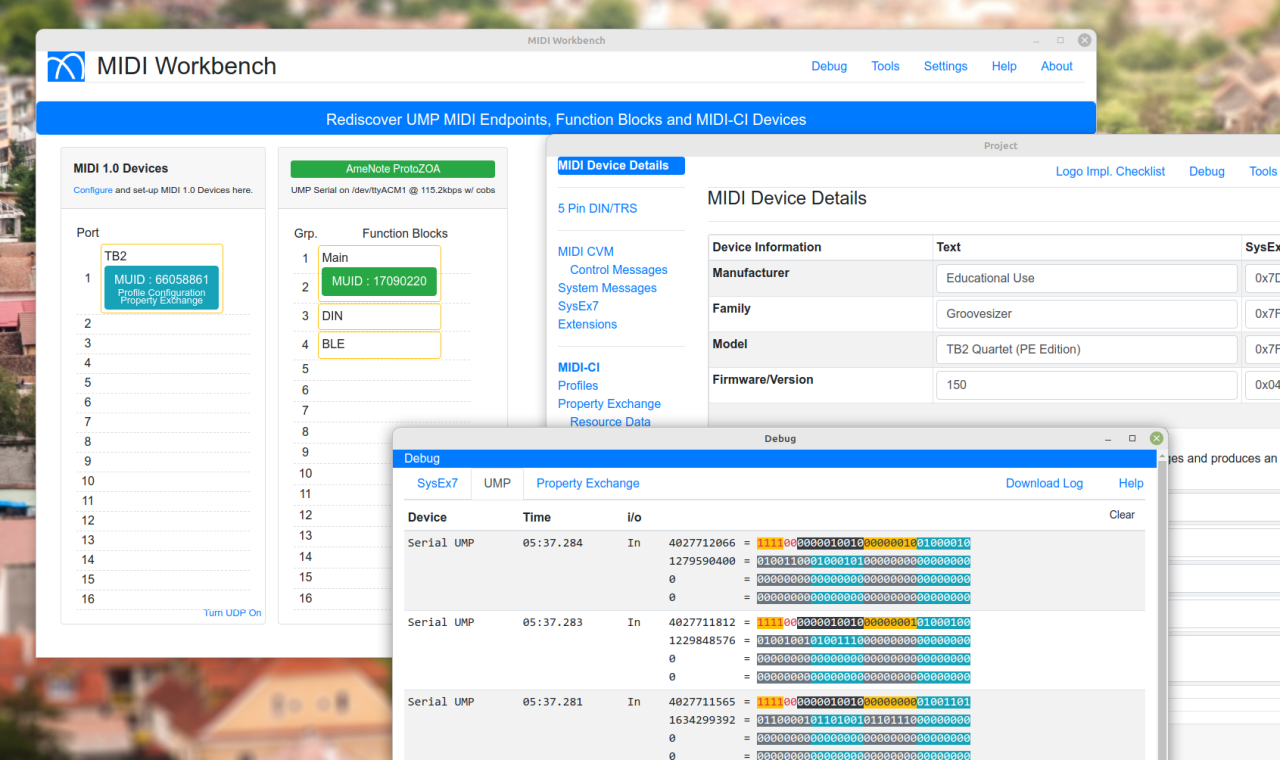MIDI Association announces global initiative by over 50 MIDI Association companies to prototype MIDI 2.0.
The MIDI Association has released details of the ongoing, industry-wide initiative by over 50 MIDI Association companies to develop MIDI 2.0 products and services. Despite the challenges presented by the pandemic, MIDI Association members persevered, and have addressed these challenges through global collaboration and cooperation.
| Yamaha Corporation has funded the development of the MIDI Workbench, a software tool for MIDI 2.0 testing and compliance developed by Australian Andrew Mee. |
|
|
MIDI Workbench MIDI 2.0 testing and compliance tool
The MIDI Workbench MIDI 2.0 is a Standalone Electron Application for complete MIDI 2.0 environment. This workbench uses UMP internally and translates MIDI 1.0 (including MPE) to and from MIDI 2.0.
|
Mee has also updated firmware for the TB2 Groovesizer, an Open Source MIDI 2.0 hardware synthesizer developed by Jean Marais, a South African living in Taiwan.
With the Quartet firmware, the TB2 is a 4 voice paraphonic wavetable synth shield for the Arduino Due development board.
The TB2 features 2 oscillators per voice, an ADSR envelope, LFO, digital filter, arpeggiator, as well as a 16-step sequencer.For sound generation, the TB2 makes use of the pair of 12-bit DACs built into the Arduino Due’s 32 bit ARM processor.
The TB2 uses an SD card for storing patches and sequences, and it also allows the user to load single cycle waveshapes for the two oscillators and the LFO. The Groovesizer only has a 5 PIn DIN MIDI In and a 5 PIn DIN Out.
So how can it be a MIDI 2.0 device? MIDI 2.0 is defined in the specifications as something that can establish bi-directional MIDI connectivity that allows two devices to connect to each other and query their capabilities (MIDI Capability Inquiry) and auto configure themselves. So MIDI-CI Profile Configuration and MIDI-CI Property Exchange can be done on any MIDI 1.0 transports because the device discovery is done using MIDI 1.0 Universal SysEx Messages. |
|
|
| Canadian-based company AmeNote, founded by industry veterans Mike Kent (Chair of the MIDI 2.0 Working Group) and Micheal Loh (founder of iConnectivity) has designed ProtoZOA, a flexible Raspberry Pico based prototyping tool for MIDI 2.0.
To accelerate MIDI 2.0 development, the MIDI Association has helped fund ProtoZOA’s technical development and donated ProtoZOAs and TB2 Groovesizers at no charge to any MIDI Association member who wanted to join the prototyping effort.
These tools work together for prototyping and testing foundational MIDI 2.0 features such as the new Universal MIDI Packet, MIDI-CI Discovery, Profile Configuration, Property Exchange, USB MIDI 2.0, and MIDI 1.0 to 2.0 Translation.
With these advances, companies around the world now have the software and hardware tools needed to build, test, and ensure the compatibility of their MIDI 2.0 products.
Amenote developed the ProtoZOA using Raspberry PICO CPUs because they are openly accessible and extremely affordable.
ProtoZOA is a USB MIDI 2.0 device that software developers can use to test with their MIDI 2.0 applications and its firmware provides source code that hardware developers can incorporate in their own MIDI 2.0 devices. MIDI Association members are currently helping to test, and optimize the ProtoZOA code. |
|
|
“Our plan is to release most of the ProtoZOA source code as Open Source with a permissive license. That will allow even non-MIDI Association members to use the code to develop MIDI 2.0 products.”
by Mike Kent from AmeNote and Chair of the MIDI 2.0 Working Group
| With a hardware and software foundation for MIDI 2.0 development in place, companies can move forward to take advantage of the protocol’s advanced features—as well as maintain full backward compatibility with existing MIDI 1.0 gear. |
|
|
“These MIDI 2.0 prototyping efforts highlight what is truly unique about the MIDI Association.
Since MIDI’s genesis, companies that are traditionally fierce competitors have chosen cooperation as the best way to solve difficult problems—and to contribute those solutions at no charge back to the global community, for the benefit of musicians, artists, and engineers everywhere.”
by MIDI Association president, Athan Billias.



